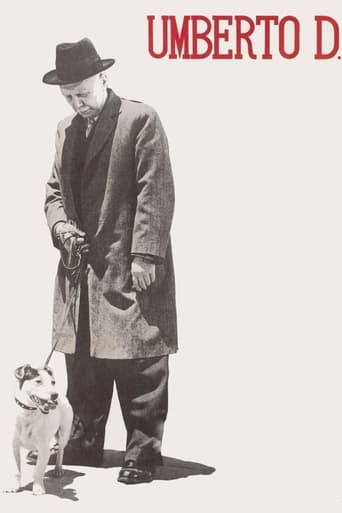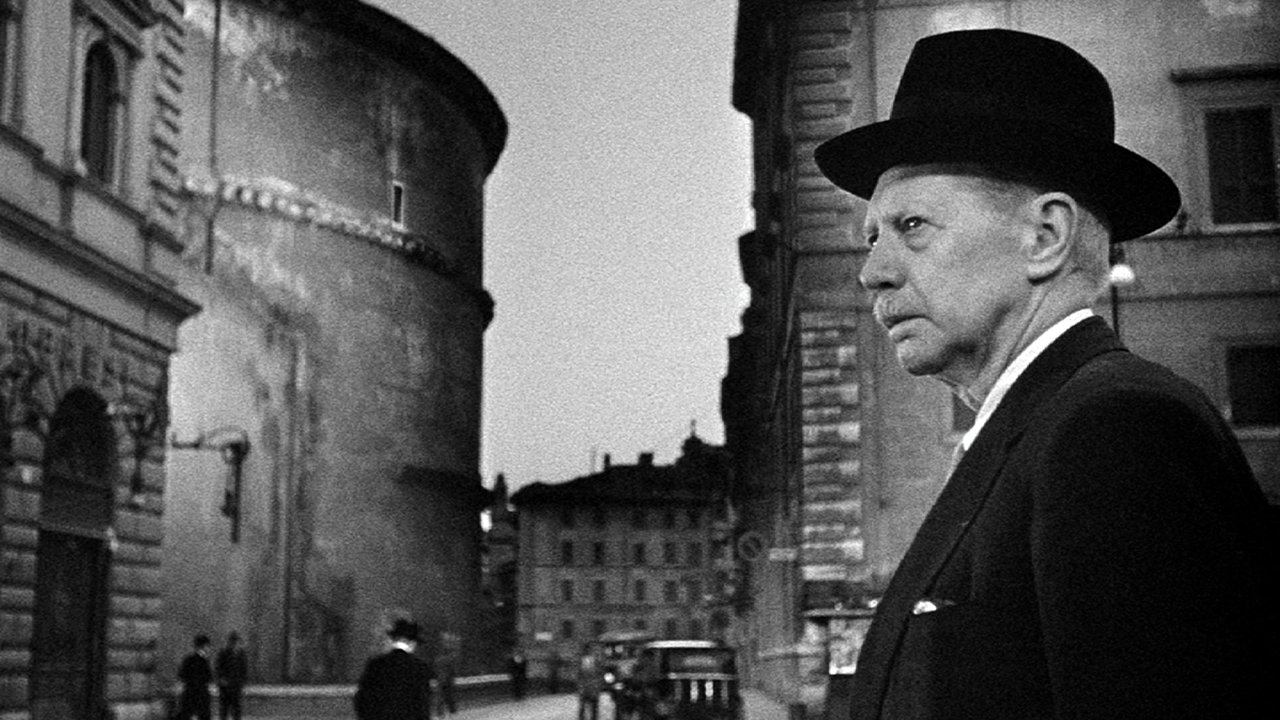Jeff Strichart
I mainly posted this review to say that it is my favorite film of all time, and so I was flattered to read here that Ingmar Bergman said that it was his favorite film of all time as well. It is a must-watch as long as you are of the right persuasion and do not buy your movies at Walmart, because you will not find anything blowing up here; no product placement and it was not uber-market tested to appeal to the least common denominator. Nor does it feature played out actors delivering sound bytes disguised as lines. In fact much of the cast of Umberto D. were not even actors. However if you have an attention span longer than that of a flea and know how to appreciate a masterpiece then this is one for you.
Nicole C
At first, the film takes a while to get going, and one wonders what this story is about. Throughout the film, Umberto's trouble with money gets increasingly intensified, as he ranges from pawning his belongings to near begging. In the olden days, this style very much shows the true realism. It had very little montage, in the sense that it didn't guide our associations, and more of the realistic filming that Andre Bazin favoured. (Bit of history for you). Everything to the shots, acting, and settings, were planned to give the most realistic portrayal as possible.The actors were mostly newcomers to the industry, and they did pretty well considering. Though maybe it would have been better to have actors with more experience, as the acting felt awkward at times. The film was well made in terms of continuity, and though some parts dragged, this could just be a depiction of life going on. It doesn't add unnecessary drama to fill in the time like most movies do nowadays.As the movie goes along, I find myself sympathizing with Umberto, and wish that he will be able to find a solution to his troubles. The end though, is pretty surprising as it is not a typical ending with closure. In fact, as with the rest of the film, it shows a more realistic ending and was really heartfelt. The addition of Flike as his companion is such a great idea as they played that angle perfectly. Flike is so cute!Read more movie reviews at: championangels.wordpress.com
jackasstrange
Is a film that captures perfectly all the aspects of the retired, poor old man's life and his place in a miserable, dirty society. What happens in this film; the message it brings, can still be applied to MOST of today's societies, because unless if you are a millionaire, being old is a heavy weight, because no one cares about you. What really happens is the opposite: actually, everyone despises you. I like this kind of film, because while sad, depressing and all, is there to show us a truth that we often try to hide of, and this kind of film needs to exist to remind us that we might be the Umberto D. of tomorrow, so we, the people who got "the control" of the world, should be a bit more sensible and then respect the lifetime of these people who once contributed to the society with their hard work. About the film: I like the use of certain objects as metaphors (The old man selling a clock; as an example) and is much superior than the other neorealist films I've seen from Italy. Is very well crafted, very realistic. I just wished the acting _ of the entire cast_ was better. I thought the protagonist did good, but he's certainly not great at acting. I am aware of the fact that the neorealist directors preferred to cast amateurs instead of professional actors, and this was one of the weaknesses of their movement. My rating: *10/10 *
Greekguy
First, let me admit that I love nearly all of the films generally grouped into the category of Italian Neorealism - whether it is works by Rossellini, De Sica, Fellini or Visconti or even the comedies of Comencini. To me, these films explore what it is to be human, and they do so with an eye for the mundane, the extraordinary and the exquisite, so that we are shown the boredom, the challenge and the joy of being alive. Because they want to do this, they play by different rules. These movies, even when their subjects include war or human passion or death, do not omit the everyday aspects of existence. For this reason, some viewers may find them slow, or ask why certain elements are included that do not directly serve the main plot. But that is precisely the point with films of this kind: the film is not the sum of its action, but the realisation of a tangible, fallible, fragile world in which certain actions take place.Vittorio De Sica's "Umberto D." is about a retired civil servant who cannot survive on his pension. For the first time in his life, or so it seems, he is in debt. This shames him to a degree, but he has for the most part learned to cope with the shame and even work a few desperate angles to his advantage. However, what he cannot seem to surmount is the debt he owes to his landlady, who wants him out of the building in any case. That the man has nowhere to go but the poorhouse, and that in going there he would have to give up his dog Flike, troubles no-one else except his landlady's sympathetic young pregnant and unmarried maid (played wonderfully by Maria Pia Casilio in her first screen role).That, essentially, is the plot of the film. In showing this, De Sica manages to give us glimpses at sexual double standards, indifferent government, cold capitalism, the practical use of religious piety (a wonderful scene in the hospital involving a sister of mercy)and faithful canine love.The performances are very good across the board, but the star, Carlo Battisti, a professor of linguistics who never again starred in a film, is outstanding. On his slight shoulders he carries the weight of a world now vanished, a richer and better world that can only be appreciated to its fullest when looking back with wistful eyes.This film isn't perfect, but for me, it will do until perfect comes along.


 AD
AD




